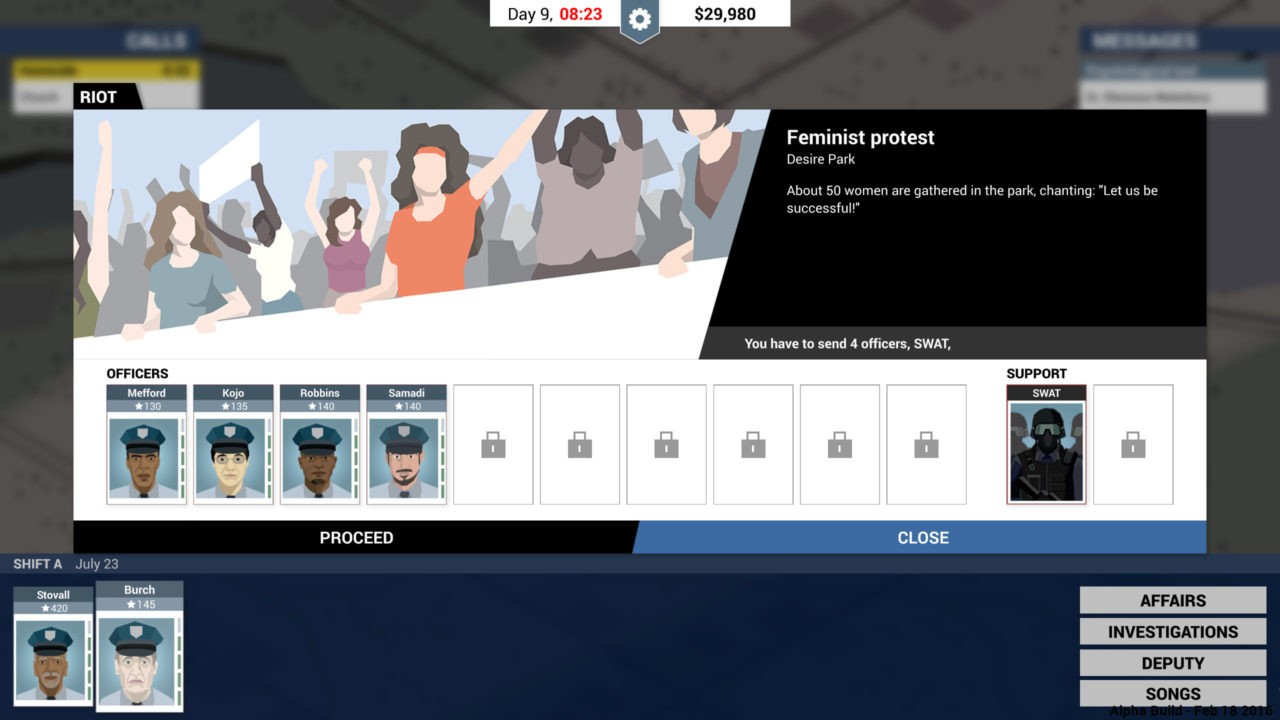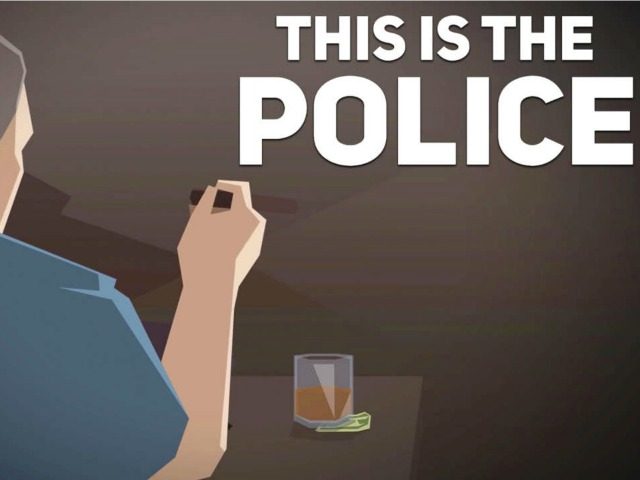Weappy Studio’s This Is The Police is a gripping, narrative driven police chief simulator, loaded with hard choices and deals with the Devil that is sometimes bogged down by its own gameplay mechanics.
A white supremacist group had been escalating hate crimes in Freeburg to near epidemic levels. An officer’s funeral was being held that day, as if to punctuate City Hall’s demand for action. But rather than grant me the funding I needed for improved equipment and more staff, they asked me to find a way to fire all black officers on the force, in order to avoid direct conflict with the gang. Do it, and I would have the quiet approval of the local government. Ignore the demand, and there would be consequences.
The situation was a grave danger to the officers themselves. Losing the support of City Hall would make their job even harder, and sending them out into a violently tense situation with our current roster was practically a death sentence in and of itself. I already felt dirty.
I looked for justifiable reasons for which to dismiss the targeted officers. One was well into retirement age — I didn’t want him on the street anyway. A group of middling officers remained, the sort that could easily be replaced. I found myself responding to mild calls by putting them in situations that could give me justification for firing them. There are a lot of reasons that the game will accept as a “just” excuse to take someone’s badge, and you have enough power to manipulate things just enough to nudge it along. I refused to simply fire them all without cause, so instead I gave them relatively safe opportunities to fail.
It was unethical, and I knew it. But losing the support of City Hall would reduce our funding, strangling our ability to protect citizens. Officers and civilians of every race would be in more danger. I was trying to serve the greater good, but it didn’t feel that way.

On the day before the deadline, I sent my lowest rated black officer to respond to an innocuous disturbance at a small storefront. What appeared to be a simple argument turned into a hostage situation, and I hadn’t provided adequate backup. It looked like the criminal would escape, and an innocent — as well as a perfectly respectable officer of the law — would die because of my compromise.
But they didn’t. Against the odds, the officer succeeded. The perpetrator was cuffed, civilian unharmed, and my officer returned with the assignment completed and a small skill bump as reward. I could take no credit. I was, in fact, horrified. It was a Pyrrhic victory, and I was out of options. I needed her badge if I wanted to placate the government and take the sting from our most destructive citizens.
Instead, I promoted her.
The next day, the city slashed my funding. One officer left the force, two others were attacked. An armed robbery went south, and another patrolman was shot and killed. I was pulling from one shift to another to cover the lack of boots on the ground, and that’s when the local mafia showed up with their own solution to my sudden funding problem.
This Is The Police is chock full of these situations, laced with a narrative about a man struggling toward the end of his retirement is a gripping police procedural full of dirty politics. Sometimes all of your choices are bad. Sometimes you snatch victory from the jaws of defeat, and sometimes assured success ends with good people in body bags.
You’ll fight with the aforementioned City Hall and deal with organized crime. You’ll learn about your officers, their lives, their loyalties and politics. Sometimes they’ll lie to your face. Sometimes they’ll come through seemingly impossible situations. Sometimes they’ll die. Each day, newspaper headlines will reflect those decisions or hint at what’s to come.

The graphics are simple, but effective. Voiced cutscenes are done well enough, guiding the chief’s story as you progress from day to day. Yet the most compelling moments have no animation or voice at all. The game is sadistic. It presents simple questions with complex answers, very few of which are clearly right or wrong. It makes a case for a thousand little sins, or gives you plenty of reasons to turn your head for just a moment.
The branching narrative helps with replayability that would otherwise become repetitive, despite nominal randomization of events. You can slip toward the dark side of corruption, or run breakneck into its profitable embrace. You can try to stay clean, watch your pockets empty, and try to keep the city from descending into chaos without compromise.
Most likely, you’ll do a little of all these things. Roleplaying a faultless paragon or mustache-twirling villain is easy. It’s much more difficult to pretend that you are the one in the chief’s seat and weigh the choices with which you’re presented. Unfortunately, those decisions can cascade. A couple of wrong moves or some bad luck and you can easily find yourself lacking the resources to dig yourself back out of a tough situation.
The meat of the game itself is a city view, in which various emergency calls come in. You’ll assign officers, wait for them to arrive on scene, and then witness the result — or make a few more choices to help decide the outcome. Hidden dice rolls weighted by your choice of officers and actions will end with success or failure. Anyone can die, and the bad guys sometimes get away. Unfortunately, the impact is somewhat lessened by pacing.

Because the game is about managing your personnel and resources, timing is key. It takes time to send an officer, time for them to resolve the situation, and time for them to return and be available for another assignment. Unfortunately, that also means you’ll spend a good bit of your own time waiting until you can act again, doing nothing. It’s never more than seconds, but momentary decisions separated by even ten seconds can begin to drag. This is not an experience for the twitchy or impatient.
The game likes to straddle the line between visual novel and management sim. When it works, it really works. When it doesn’t, it feels like you’re doing a whole lot of waiting for something to happen. Sometimes mundane staffing issues can stall the story, and sometimes the story can interrupt you when you’re fully immersed in the city’s day-to-day drama. It isn’t perfect by any means, but it succeeds far more often than it fails.
This Is The Police is rarely “pleasant.” Faint sparks of humor and a jaunty soundtrack only seem to amplify the shadows cast by the characters and events you encounter. It raises more questions than it answers, and it delights in ethical quandary. It is a game that willfully challenges your judgment and asks you to mete out justice in unjust situations. It is a digital Choose Your Own Adventure as written by the Devil, played out on an all too familiar stage.

Your enjoyment of the game will hinge on your personal commitment to its fiction and your ability to take a dozen little bits of information and see how they build a character. It is a game that gives you just enough narrative structure to create your own stories, and just enough rope to hang yourself.
It’s hard to give This Is The Police a solid recommendation, because many elements could become tiresome after enough time spent with the game. It’s the sort of experience that is destined to develop a cult following. Those who enjoy it will have fascinating stories to tell, but it is difficult to predict whether the person hearing them would find those stories on their own, given the same tools.
I’ve enjoyed my time with the game, and I’ll likely be going back to it. If a methodically paced blend of management sim and interactive fiction sounds like your bag, you’re only about fifteen bucks away from a uniquely memorable — if flawed — rough-cut gem.
Follow Nate Church @Get2Church on Twitter for the latest news in gaming and technology, and snarky opinions on both.

COMMENTS
Please let us know if you're having issues with commenting.